(The following is an article from The Toccoa Record, November 29, 1917 (Used by Permission) taken from the book A Tree God Planted by Troy Damron)
The largest crowd of humanity that Toccoa has ever entertained greeted Billy Sunday when he arrived here at 11:30 a.m. Monday in a special car. He was accompanied by his “family†of church workers, including Homer Rodeheaver with his trombone; the American Quartet from Camp Gordon, several well known citizens and ministers from Atlanta, conspicuous among them being Rev. J. Orme Flynn, Dr. Ashby Jones, J. Wood White and several others.
A number of persons who had planned to come from Atlanta failed to reach the terminal station in time, owing to a misunderstanding of the train schedule. Among this number were the reporters and staff artists of the Constitution and Georgian which accounts for the absence of the news of Billy’s visit to Toccoa in these enterprising journals.
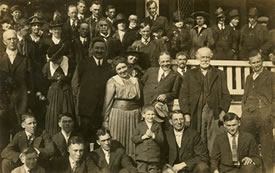 Rev. R. A. Forrest, general manager of Toccoa Falls Institute, was instrumental in getting the great evangelist to visit Toccoa, went to Atlanta Sunday and accompanied the party and looked after their comfort.
Rev. R. A. Forrest, general manager of Toccoa Falls Institute, was instrumental in getting the great evangelist to visit Toccoa, went to Atlanta Sunday and accompanied the party and looked after their comfort.
Rev. Brooks Smith and wife, instructors at the Institute, also came up with them, and assisted Mr. Forrest with the details.
The distinguished visitors were met at the station by an immense throng, who were anxious to get a look at Billy and “Ma,†his amiable and ever-smiling wife. It was with difficulty that the automobile was reached that was to carry them to Toccoa Falls. Probably the one event of the day that pleased Billy most was the greeting he received from the five hundred public school children, lined up on the west side of the Court House square, who cheered him and yelled their school greeting.
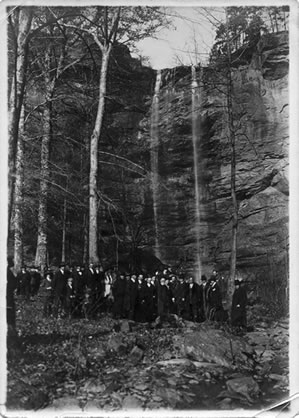 Then the entire party, in automobiles furnished by citizens, hurried out to the Institute, and at once proceeded to see the far-famed Toccoa Falls.
Then the entire party, in automobiles furnished by citizens, hurried out to the Institute, and at once proceeded to see the far-famed Toccoa Falls.
“Gee, this is great,†said the blithe little evangelist, as he ambled upon one of the large rocks to get a better view. “It don’t seem possible, but I guess you are telling me the truth that this is higher than Niagara.†Then he hurried back to the “Ellen Stewart†cottage, where he rested for a few minutes, and held an informal reception until dinner was announced.
This latter function was a grand success—probably never having been equaled in point of quality and service within the county for as large a number of people, about 125 being seated at tables. Students of the Institute acted as waiters, all under the admirable supervision of Mrs. Forrest. Chef Forbes and his staff of assistants in the kitchen had everything, from the frying of the chicken to the browning of the sweet potatoes, done just right, and Billy showed his appreciation of it when he put his hand on Mrs. Sunday’s shoulder and said: “Gosh, Ma, nobody could beat this.â€
The large dining-hall was beautifully decorated with smilax, which extended around the walls just below the ceiling. The word “Welcome,†deftly constructed of with white chrysanthemums in a background of green, occupied a space across the chimney, above the mantelpiece. A blazing log fire in a huge fireplace added additional cheer to the scene.
Yellow and white chrysanthemums were used as centerpieces for each table.
After dinner the visitors were shown over the grounds, visited the laundry and shops, and then returned to Toccoa, where Mr. Sunday was announced to speak at 2 o’clock, from a platform in front of the Kilgo Mercantile Co.’s store, opposite the Court House. Here a crowd of people, variously estimated at from 7,000 to 10,000 had assembled. They had come by trains and automobiles from every point of the compass for full fifty miles. Many came on foot, hundred arriving in town as early as eight o’clock, and patiently waited for the appearance of the “greatest preacher in the world.†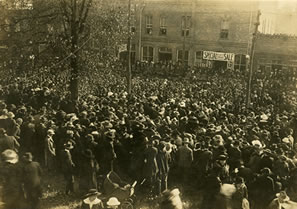
Preceding the arrival of Mr. Sunday, the American Quartet sang a number of songs accompanied by Prof. Underwood on his cornet. Dr. J. J. Hall, of Atlanta, was introduced by Dr. Jeff Davis, president of the local society, who spoke briefly on the work of the Red Cross. Then Mr. Forrest introduced “Rody†who put the crowd in a happy mood by playing “Yankee Doodle,†“Dixie†and “Brighten the Corner†on his famous trombone. Then he asked all to sing the latter song, and he was evidently surprised to find the ready and unanimous response that came from the throats of the thousands who were perfectly familiar with the popular air.
When Mr. Forrest introduced the speaker as “the only Mr. Sunday,†the audience gave him a warm greeting by clapping their hand. His voice was quite husky, and many persons on the outer edge were unable to hear him. By they could see him, and when he placed both hands to his mouth occasionally and trumpeted a sentence to the people that swarmed back over the lawn to the Court House steps it compensated the latecomers.
When Billy began to speak he faced the large flag that floated from the tall staff on the square, erected by the Stephens County Camp of Confederate veterans. It evidently put inspiration into his sermons, and he soon made up in pyrotechnics what he lacked in volume of voice. His theme was loyalty to Government and Good Citizenship, and he soon launched into a scathing denunciation of the enemies of our country. His language, however, was more moderate than he usually employs in dealing with the subject, but few sentences were out of the ordinary. The most sensational phrase, perhaps, was this: “If I were God, I would have sent the Kaiser and his whole dirty bunch of cut-throats and women-murders to hell long ago.â€
After a passionate plea for the people to stand behind President Wilson, the necessity for leading pure lives and the up building of the grandest republic on this earth, Mr. Sunday suddenly threw up his hands and announced that he “was all in.†He appeared to be exhausted, and requested Mr. Rodeheaver to speak. “Rody†made a short talk, the American quartet sang, and Billy having recovered his voice dismissed the meeting with on of his characteristic prayers.
The Sunday party then hurried to the station and boarded their waiting car, which was attached to train No. 30, and from the rear platform Bill and “Ma†waved a cherry adieu as the train pulled out to carry them back to Atlanta, where Billy says he is going to “give the Devil the greatest run for his money†that His Satanic majesty has ever had.
The evangelist was no doubt well pleased with his off-day trip to this little mountain city. The sunbeams that played over his face as the train glided away proved it.
The Toccoa Record, November 29, 1917 (Used by Permission)
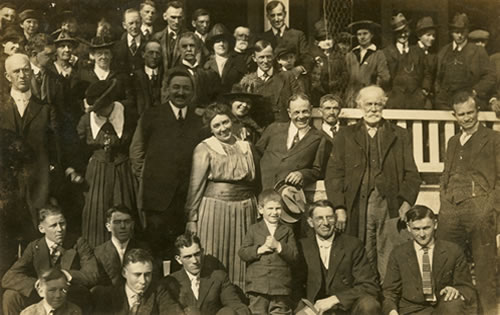
Group of people during Billy Sunday’s visit to Toccoa Falls
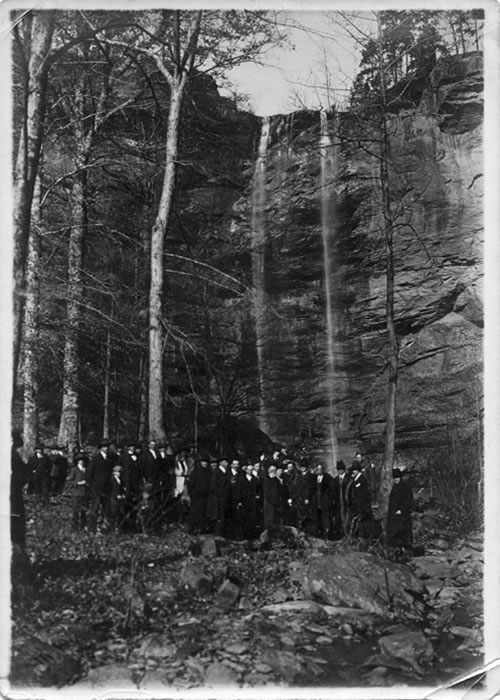
Billy Sunday and his group at Toccoa Falls
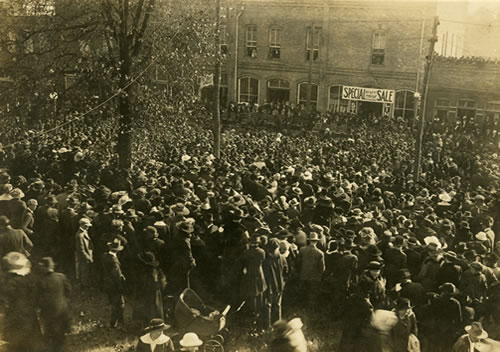
Crowd in Toccoa, Georgia to see Billy Sunday
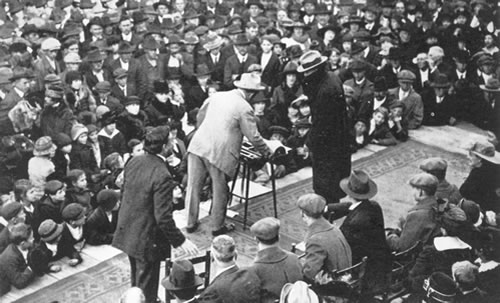
Billy Sunday
